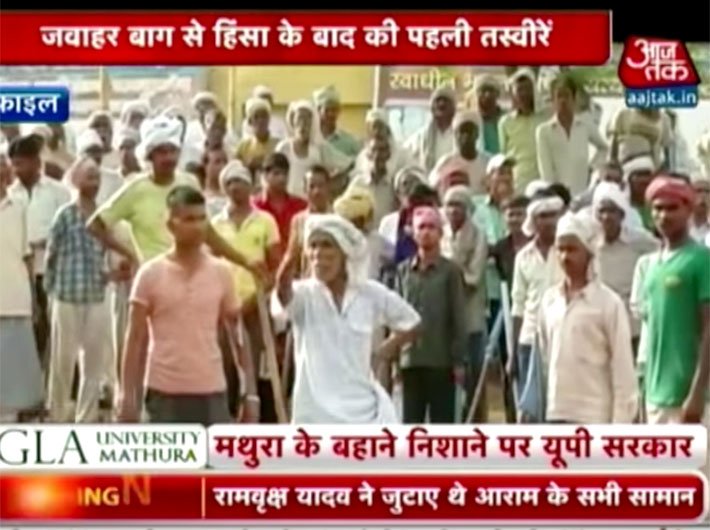The Uttar Pradesh government has acknowledged its failure of operational lapses for the violence that erupted in Mathura on May 2. That, however, is not enough. An armed clash that broke out between police officials and encroachers at the city’s Jawahar Bagh and left as many as 29 people dead, including two policemen, needs a strong perusal.
While the proximate causes of the Mathura mayhem are being inquired into, policy lessons also need to be identified. Here, five governance issues immediately come to mind which the judicial inquiry may not delve into.
First, the district magistrates can withstand the severest of political pressures as long as they have the confidence of the concerned chief minister. After all, a district magistrate represents the government in a district where the government is run by the CM. My experience as a DM in three districts of Uttar Pradesh says that if the situation turns grave, the chief minister would give full support to the district magistrate. In an assessment of a particularly difficult situation in Agra, I had advised that acting on the directions of the local minister would lead to a law and order situation. This was discussed by the CM with all the MLAs of the district for a feedback and ultimately my assessment was agreed upon. Also, the minister was asked to back down. Thus, political patronage or pressure cannot be an excuse for the breakdown of law and order, except in cases where the CM is involved or chooses to ignore the specific advice given by the DM.
Second, it is expected from the DM to show leadership qualities by piecing together the different elements of information that routinely come to him, in order to connect the dots and see the larger picture. In Mathura, the district administration seemed content with writing reports to the state government without detailing the situation at Jawahar Bagh. Even the 40 reports of the local intelligence unit on firearms possessed by members of the Swadheen Bharat Subhash Sena (the group behind the attacks) indicated a general warning whereas the condition there warranted a detailed report, including the weapons that were being stockpiled as well as the capacity and intention to use them, and the requirement of specialised police elements to handle the situation.
The problem on the policy front is that the law-and-order related training of IAS officers continues to be as per provisions of the Police Act, the Code of Criminal Procedure and the Commissions of Inquiry Act. That is, the training is based on powers provided to the officers under these acts rather than on understanding the social processes, intelligence appreciation, building contacts with local politicians and reporters, and responses to armed groups that would enable them to better anticipate events and advise the chief minister.
Third, the overall training of IAS officers also needs to be reviewed beyond their role in law and order, currently defined as relations with the police. In addition to a grounding in law, the new challenges have to form a key, and not an ancillary, part of the time they spend at the national academy of administration in Mussoorie. As it is, IAS officers spend very little time in the districts and the state civil services now primarily deal with land and development matters. With the growth in urbanisation, new types of law and order problems have come up, involving concentrations of population, which are often violent. Mathura is one such example. The solutions do not lie in asking for more force but in a tailored response to a specific situation, recognising that each is unique. The core of the training should also move away from lectures by retired officers towards focusing on case studies like that of Mathura.
Equally important is the change in mindsets from maintaining stability to supporting a change and transformation, and this requires a new skill set. An example is digitising the delivery of government services using the cyber secure citizen identity, in the Aaadhar Card, which we now have. As expectations have risen, the stakes have also become higher. Data analytics should now become as important as legal knowledge in the training of IAS officers.
Fourth, the district magistrate needs to have an institutional relationship with the intelligence bureau to get oral alerts. In all the three districts where I served as the DM, I found such contacts extremely relevant, even vital, in maintaining law and order. The intelligence bureau has better sources of information than the local intelligence unit and their inputs are timely, precise, and comprehensive.
Fifth, there is a need for a ‘manual’ on the role of the district magistrate and not, as at present, mere listing of powers they enjoy. The department of personnel and training which works with the state governments should focus on leadership, technology, relationships and national programmes. Areas where ‘public interest’ has to be safeguarded have evolved with expanding economic activity, for example, the broader environment and not pollution; water management rather than the focus on drought relief; linkages between traffic management and urban design and not just enforcement of building and transport laws. Exploitation of the full potential of foundational initiatives of the government like Aadhaar card, pension schemes and post banks need the attention of the district magistrate, even though they may not come under the ambit of the state government but are essential components of raising standards of living and economic growth.
The institution of the DM has no parallel with any administration in the world; nowhere is so much power given at such a young age and nowhere is the expectation greater. The position remains as much relevant today as it was – when instituted by Akbar and fine-tuned by the British – since the transition from rural poverty to urban middle-class levels of well-being unleashes social forces that need to be managed at the local level. Elected representatives at the district level are not able to discharge this function because of the need to bridge the different levels of government and retain the confidence of all sections of the population. The district magistrate should be made responsible for achieving the national vision at the district level.
The policy lessons of Mathura are as important for the Centre as the implementation failures are for the state government.

